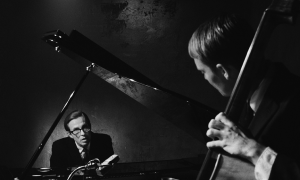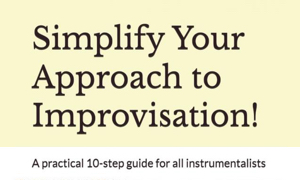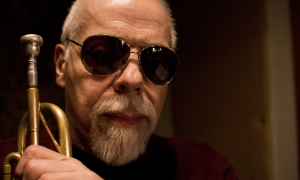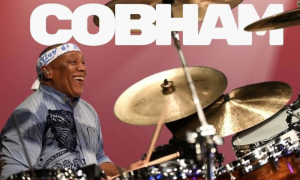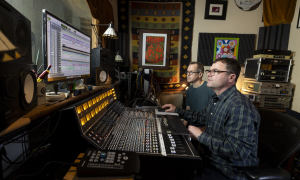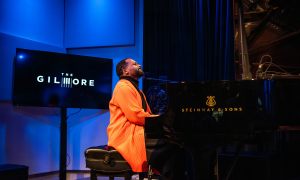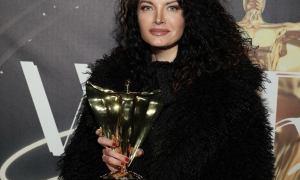Leading up to the April 28th premiere at Montgomery County Community College of a new piece written by Muhal Richard Abrams for Bobby Zankel's Warriors of the Wonderful Sound, music writer Shaun Brady (JazzTimes, Philadelphia City Paper, Philadelphia Inquirer) will be contributing a series of blog posts about the project. This is the second installment of Brady's four-part series.
A Conversation With Vijay Iyer
On April 28 at Montgomery County Community College, Bobby Zankel’s big band the Warriors of the Wonderful Sound will premiere a new piece written for the ensemble by legendary pianist/composer Muhal Richard Abrams. In the weeks leading up to the event, we’ll be discussing Abrams’ influence and legacy with some of modern jazz’s leading figures.
Pianist Vijay Iyer’s wide-ranging discography runs the gamut from his ground-breaking trio work to his long-standing collaboration with alto saxophonist Rudresh Mahanthappa, the jazz/South Asian fusion ensemble Tirtha to the collective trio Fieldwork with fellow innovative composers/improvisers Steve Lehman and Tyshawn Sorey. His trio’s acclaimed CD Historicity earned him a 2010 Grammy nomination, and their recent follow-up, Accelerando, further evolves their expansive approach. In his Harlem home, Iyer recalled one early encounter with Abrams, at a gig by the initial incarnation of Fieldwork (with Aaron Stewart and Elliot Humberto Kavee).
Vijay Iyer: The first Fieldwork gig ever was in 1999 at the Alterknit, which was this horrible little prison cell of a room in the basement of the Knitting Factory with café tables and metal folding chairs. I remember there at the front table were Muhal, Henry Threadgill, and Andrew Hill sitting right in front of us. That was basically one of the scariest gigs of my life, but it was so nice to see that these guys who’ve been such important creative forces still cared about what people like us were doing, especially since we weren’t even on the map. Afterwards, I talked to Muhal because I was so grateful that he came but at the same time I was sort of mortified to be seen in a room like that, or that people of their stature had to come into that space. It was not dignified. He said really nice things about the music, and I said, ‘We’re just trying to get out of this room.’ And he said, ‘Well, play your way out.’ Which is to say, the music contains within it the ingredients for self-transformation. And I can honestly say thirteen years later, that’s what happened.
How did you initially discover Muhal’s music?
VI: In the nineties, when I was living in Berkeley CA, I used to buy a lot of used CDs from this place called Amoeba Records. I noticed that somewhere in the ‘A’ section there was a guy who put out a lot of records on Black Saint/Soul Note Records, so I just started acquiring some of these albums because they were connected to other artists that I was familiar with and really interested in. People like the Art Ensemble of Chicago, Anthony Braxton, Threadgill. They all talked about Muhal in really exalted terms, so I started checking out the albums. His level of achievement as a composer was staggering considering that you didn’t really see him ‘on the scene’ as much as everybody else.
What attracted you so strongly to his music?
VI: I started to realize that this guy was a real important force in the music, and the more I got into his work the more mysterious it got for me. There seemed to be no end to it. It all covered so much ground at a really high level, and I realized that there was something to it that was about self-transformation as part of the creative process. I think that mentality has pervaded his work and also influenced others. There’s the sense that through creative action you become something that you weren’t before. That was inspiring to me on many levels, partly because I was in the process of becoming and figuring out what my artistic path was going to be. So it came to me at a really pivotal moment. But beyond that, it was the level of detail and rigor and playfulness with the fundamental building blocks of music, a radical inventiveness and creativity that is just so inspiring.
Do you continue to learn from him?
VI: He’s kind of been my little personal magical pantheon. I had a nice experience last October because my trio did a double-bill with the trio – George Lewis and Muhal and Roscoe Mitchell – out in Macedonia, so we spent a nice evening together. I hadn’t actually seen him in a couple years because I’d been traveling so much, but he told me that he’d bought my solo record. I was struck that someone at his age is still taking in information and is very aware of the energy and the dynamics of these multiple intersecting scenes. He knows what’s happening in a way that’s really astute and insightful, and combined with all the esoteric leanings that he has, you realize that this is a sage, almost like the Manhattan Towers are the mountaintop and he’s sitting up there listening to the world, hearing everything.
Are there specific influences or impacts from Muhal that you can point to in your own playing?
VI: The thing is that he’s not interested in influencing people. He doesn’t want people to be like him; he wants people to become more fully themselves and develop a sense of groundedness and self-assuredness that comes from that. He’s never been interested in remaining in one place. I feel like Muhal has consistently built upon his previous achievements, so it’s all had this trajectory of growth and discovery and also transformation. It ends up then having that transformative quality when you hear it. It cleanses you and it brings you to a new awareness.
Do you have any particular favorite recordings?
VI: I’ve seen him live so many times that those now loom just as large to me. He’s somebody for whom the recorded documents are only part of the story. When he got the NEA Jazz Master award and wrote a piece for the Jazz at Lincoln Center Orchestra, you could hear a history of achievements just in that one piece because it has such a spectrum of possibilities. He’s very savvy about writing for not just any big band, but each ensemble in particular. He really brought something out of that band that hadn’t happened before, which was really inspiring to hear.
He’s now doing something similar for the Warriors of the Wonderful Sound, writing a piece that won’t be recorded but only performed live.
VI: I remember speaking with him before one of his own AACM concerts and I asked him, ‘So, are you doing some new music tonight?’ And he said, ‘I always do new music.’ Like it was obvious. That was kind of the implication: it has to be about now, about today, about where you are at this moment. So I think you have to understand his music as a living force. We’re fortunate to have all the documents that we have of it, but it’s also important to know that’s the tip of the iceberg. Prolific doesn’t begin to cover it; this guy’s music is part of his process of living. He brings you to the brink of your own understanding of what music is and then he stretches that and leads you somewhere else that you haven’t been. It’s really a rare and special thing in the world.- Shaun Brady
Bobby Zankel and the Warriors of the Wonderful Sound pay tribute to Sam Rivers on Thursday, Feb. 2 at 9:30 p.m., $7, at Tritone, 1508 South Street, 215-545-0475.
For more information on the April 28 concert with Muhal Richard Abrams, please visit: mc3.edu.
A Conversation With Vijay Iyer
On April 28 at Montgomery County Community College, Bobby Zankel’s big band the Warriors of the Wonderful Sound will premiere a new piece written for the ensemble by legendary pianist/composer Muhal Richard Abrams. In the weeks leading up to the event, we’ll be discussing Abrams’ influence and legacy with some of modern jazz’s leading figures.
Pianist Vijay Iyer’s wide-ranging discography runs the gamut from his ground-breaking trio work to his long-standing collaboration with alto saxophonist Rudresh Mahanthappa, the jazz/South Asian fusion ensemble Tirtha to the collective trio Fieldwork with fellow innovative composers/improvisers Steve Lehman and Tyshawn Sorey. His trio’s acclaimed CD Historicity earned him a 2010 Grammy nomination, and their recent follow-up, Accelerando, further evolves their expansive approach. In his Harlem home, Iyer recalled one early encounter with Abrams, at a gig by the initial incarnation of Fieldwork (with Aaron Stewart and Elliot Humberto Kavee).
Vijay Iyer: The first Fieldwork gig ever was in 1999 at the Alterknit, which was this horrible little prison cell of a room in the basement of the Knitting Factory with café tables and metal folding chairs. I remember there at the front table were Muhal, Henry Threadgill, and Andrew Hill sitting right in front of us. That was basically one of the scariest gigs of my life, but it was so nice to see that these guys who’ve been such important creative forces still cared about what people like us were doing, especially since we weren’t even on the map. Afterwards, I talked to Muhal because I was so grateful that he came but at the same time I was sort of mortified to be seen in a room like that, or that people of their stature had to come into that space. It was not dignified. He said really nice things about the music, and I said, ‘We’re just trying to get out of this room.’ And he said, ‘Well, play your way out.’ Which is to say, the music contains within it the ingredients for self-transformation. And I can honestly say thirteen years later, that’s what happened.
How did you initially discover Muhal’s music?
VI: In the nineties, when I was living in Berkeley CA, I used to buy a lot of used CDs from this place called Amoeba Records. I noticed that somewhere in the ‘A’ section there was a guy who put out a lot of records on Black Saint/Soul Note Records, so I just started acquiring some of these albums because they were connected to other artists that I was familiar with and really interested in. People like the Art Ensemble of Chicago, Anthony Braxton, Threadgill. They all talked about Muhal in really exalted terms, so I started checking out the albums. His level of achievement as a composer was staggering considering that you didn’t really see him ‘on the scene’ as much as everybody else.
What attracted you so strongly to his music?
VI: I started to realize that this guy was a real important force in the music, and the more I got into his work the more mysterious it got for me. There seemed to be no end to it. It all covered so much ground at a really high level, and I realized that there was something to it that was about self-transformation as part of the creative process. I think that mentality has pervaded his work and also influenced others. There’s the sense that through creative action you become something that you weren’t before. That was inspiring to me on many levels, partly because I was in the process of becoming and figuring out what my artistic path was going to be. So it came to me at a really pivotal moment. But beyond that, it was the level of detail and rigor and playfulness with the fundamental building blocks of music, a radical inventiveness and creativity that is just so inspiring.
Do you continue to learn from him?
VI: He’s kind of been my little personal magical pantheon. I had a nice experience last October because my trio did a double-bill with the trio – George Lewis and Muhal and Roscoe Mitchell – out in Macedonia, so we spent a nice evening together. I hadn’t actually seen him in a couple years because I’d been traveling so much, but he told me that he’d bought my solo record. I was struck that someone at his age is still taking in information and is very aware of the energy and the dynamics of these multiple intersecting scenes. He knows what’s happening in a way that’s really astute and insightful, and combined with all the esoteric leanings that he has, you realize that this is a sage, almost like the Manhattan Towers are the mountaintop and he’s sitting up there listening to the world, hearing everything.
Are there specific influences or impacts from Muhal that you can point to in your own playing?
VI: The thing is that he’s not interested in influencing people. He doesn’t want people to be like him; he wants people to become more fully themselves and develop a sense of groundedness and self-assuredness that comes from that. He’s never been interested in remaining in one place. I feel like Muhal has consistently built upon his previous achievements, so it’s all had this trajectory of growth and discovery and also transformation. It ends up then having that transformative quality when you hear it. It cleanses you and it brings you to a new awareness.
Do you have any particular favorite recordings?
VI: I’ve seen him live so many times that those now loom just as large to me. He’s somebody for whom the recorded documents are only part of the story. When he got the NEA Jazz Master award and wrote a piece for the Jazz at Lincoln Center Orchestra, you could hear a history of achievements just in that one piece because it has such a spectrum of possibilities. He’s very savvy about writing for not just any big band, but each ensemble in particular. He really brought something out of that band that hadn’t happened before, which was really inspiring to hear.
He’s now doing something similar for the Warriors of the Wonderful Sound, writing a piece that won’t be recorded but only performed live.
VI: I remember speaking with him before one of his own AACM concerts and I asked him, ‘So, are you doing some new music tonight?’ And he said, ‘I always do new music.’ Like it was obvious. That was kind of the implication: it has to be about now, about today, about where you are at this moment. So I think you have to understand his music as a living force. We’re fortunate to have all the documents that we have of it, but it’s also important to know that’s the tip of the iceberg. Prolific doesn’t begin to cover it; this guy’s music is part of his process of living. He brings you to the brink of your own understanding of what music is and then he stretches that and leads you somewhere else that you haven’t been. It’s really a rare and special thing in the world.- Shaun Brady
Bobby Zankel and the Warriors of the Wonderful Sound pay tribute to Sam Rivers on Thursday, Feb. 2 at 9:30 p.m., $7, at Tritone, 1508 South Street, 215-545-0475.
For more information on the April 28 concert with Muhal Richard Abrams, please visit: mc3.edu.







